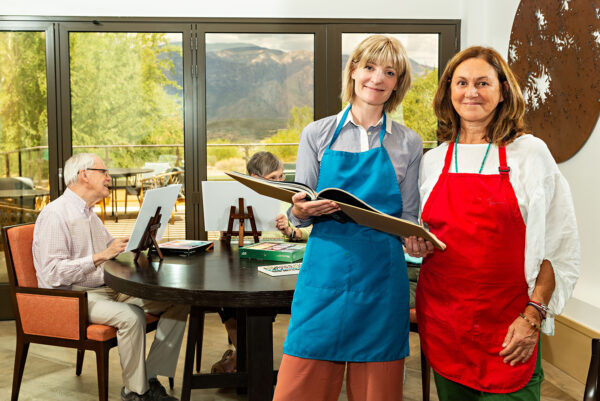
This biweekly column is sponsored by The Mather in Tysons, Virginia, a forward-thinking Life Plan Community for those 62 and better.
By Caroline Edasis, Director of Community Engagement, Mather
Research has shown that older adults who engage with the arts in a group setting — anything from dancing to a poetry group to singing in a choir — enjoy tangible benefits in multiple areas of health. This has to do with feelings of mastery, and with social connection.
What makes the journey of a lifetime so rewarding is the excitement of new possibilities — lifelong opportunities to learn more, do more, see more, experience more and feel more connected to the world around us.
With this in mind, creative arts can be an opportunity for older adults to master new forms of self-expression.
Open Studio, Open Mind
Arts engagement can be a vehicle for wellness, not just recreation. Both lifelong and new artists can explore their own Creative Age by working in diverse media including ceramics and mixed media/painting. A new love for a specific media, or a personal project can be pursued while learning more about yourself and others.
A Fresh Look at Art Appreciation
Teaching or encouraging art appreciation, can be done through lectures from an expert such as a docent. Inquiry-based art-viewing techniques — used in art appreciation — focus on the interests, experiences, and the curiosity of viewers to deliver intellectually stimulating content while challenging us to bring culture down from the pedestal and into our lives.
Did you know that the average person spends 17 seconds looking at a work of art in a museum? Within visual literacy programs, an hour can be spent describing an image, sharing stories conjured by the work of art, or even creating group poems in response to the work.
Creativity is about much more than visual art. Aging should be recognized as a time of great creative potential, whether through music, poetry, storytelling, dance and movement, or even gardening — the sky is truly the limit.
The Mather, projected to open in Tysons, VA, in 2024 for those 62 and better, is a forward-thinking Life Plan Community that defies expectations of what senior living is supposed to be.

This biweekly column is sponsored by The Mather in Tysons, Virginia, a forward-thinking Life Plan Community for those 62 and better.
While we’re all likely enjoying more time at restaurants, outdoor gatherings, wedding receptions and birthday parties, we may suddenly gain some extra pounds with all of these added festivities!
This can be particularly true for those age 60 and better, who may gain weight more quickly due to natural changes in metabolism and hormones. Of course, you can try to burn off those extra calories with exercise — but it’s also good to practice moderation in the first place.
Here are some tips to help party-goers of all ages avoid the gain and still have fun:
- If you’re an evening exerciser, try moving your workouts to the mornings, that way get-togethers don’t interrupt your exercise routine.
- Don’t go to a party hungry! You’ll have more will power if you eat a healthy, filling snack before you leave. Try an apple with peanut butter, or Greek yogurt mixed with fruit.
- If you’re heading to a potluck or party where additional dishes are welcome, bring something healthy, like a veggies and dip platter. That way you’ll have at least one nutritious choice.
- When you arrive at an event, discreetly scope out the food options before you start nibbling. Choose the healthiest options and decide which treats you must have — then skip the rest.
- Have a piece of sugarless gum or a mint ready for when you’ve eaten all you think you should.
- Throw your own party where you can control what’s served. Include healthy options for drinks as well as dining.
- When drinking, stick with wine, sparkling wine, or beer. You’ll avoid high-calorie mixers in many cocktails — including soda water, tonic, and juices.
- Alternate each alcoholic beverage with a glass of still or sparkling water. This will help keep you hydrated and sober, and save calories for the goodies at the buffet!
- Be aware of how many calories (and how much alcohol) is in your glass. Depending on the generosity of your bartender, your glass of wine may hold more than a standard serving (5 ounces).
The Mather, projected to open in Tysons, VA, in 2024 for those 62 and better, is a Life Plan Community where residents will have countless culinary options at their fingertips through modern, high-end kitchens in apartment homes and multiple restaurants onsite.

This biweekly column is sponsored by The Mather in Tysons, Virginia. You can take specific steps to improve your perceptions on aging, which in turn can bolster your health, according to Mather Institute.
How do you feel about your age?
Your response can have consequences for your health and happiness. That’s because studies have shown that our perceptions of aging can have an impact on our own current and future well-being.
“There is a large body of research that shows positive perceptions of aging — seeing later years as a time of continued growth and enjoyment — is associated with better health and stronger relationships later in life. In other words, our expectations of aging impact our behavior and our future outcomes,” says Jennifer Smith, PhD, director of research at Mather Institute. The Institute is the research arm of Mather, the parent organization of The Mather, a Life Plan Community coming to Tysons. The Institute is an award-winning resource for research and information about wellness, aging, trends in senior living and successful aging service innovations.
As part of its own research, the Institute referenced proven benefits of having a positive perception of aging:
- Longevity: In a 23-year study, older adults who reported more positive self-perceptions of aging lived 7.5 years longer than those with more negative self-perceptions of aging.
- Illness: In a study of 1,286 people (average age of 57), those who indicated that aging is a time of continued learning and development reported decreases (or slower increases) in physical illnesses six years later.
- Functional Health: Older adults with more positive perceptions of aging report better future functional health, such as the ability to do household chores and climb stairs, compared to those with more negative perceptions of aging.
- Brain Health: Compared to people with more positive views of aging, people who endorsed more negative age stereotypes displayed greater signs of risk factors for Alzheimer’s disease when their brains were examined decades later.
- Psychological Well-Being: Older adults with more negative perceptions of aging reported greater increases in depressive symptoms three years later, but high levels of optimism helped protect against this effect.
- Healthy Behaviors: Those with more positive perceptions of aging tend to engage in more preventive health behaviors and physical activity compared to those with more negative perceptions of aging.
Change Your Views
The good news is that, even if you’re not feeling very positive about aging, you can take steps to change your attitude and enjoy the health benefits above. All it takes is consciously focusing on appreciating positive experiences. Dr. Smith led a study in collaboration with Loyola University Chicago that revealed that people who took steps to savor their life lessons — reflecting on events in their past that led to knowledge that they wouldn’t want to give up — specifically “grew” their positive perceptions of aging.
You can try this on your own. Research has shown that practicing savoring, or increasing awareness, intensity, and duration of positive feelings, can boost your happiness and life satisfaction. Focusing this practice on positive reminiscence can affect perceptions of aging specifically.
To savor your life lessons, make time to reflect on a meaningful past experience, then write down what you learned from it. Take time to consider the wisdom you obtained, then identify how that wisdom has had a positive impact on your life. Repeat this exercise with other experiences from any time in your life. You can also tell family members or friends about some of your valuable life lessons, which is another means of savoring.
These research findings confirm that Aging Well can depend on your outlook — and luckily, each of us has the opportunity to control and change our perceptions and attitudes.

